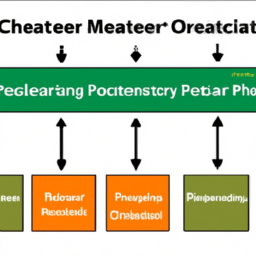Are you ready to unlock the secrets to a high score on the CAPM exam? Prepare yourself for success with our comprehensive CAPM Exam Study Guide.
Just like unraveling a cryptic code, this guide will help you navigate through the intricate structure and format of the exam, ensuring that you are well-equipped to conquer it.
With a focus on mastering key concepts and terminology, developing an effective study plan, and utilizing practice exams and mock tests, this guide provides you with the tools you need to excel.
But it doesn’t stop there. We also share valuable test-taking strategies and techniques to help you approach the exam with confidence and precision.
And because we understand the stress that comes with exams, we offer tips on managing stress and maintaining a positive mindset throughout your preparation.
Get ready to unlock the secrets and achieve a high score on the CAPM exam. Let’s dive in!
Key Takeaways
- Understanding the structure and format of the CAPM exam is crucial for effective study planning
- Mastering key concepts such as risk management, cost of capital, stakeholder analysis, and earned value management is essential
- Developing a study plan and schedule, assessing strengths and weaknesses, and utilizing various study resources are important for success
- Test-taking strategies, time management techniques, and stress management are vital for performing well in the exam
Understanding the CAPM Exam Structure and Format
Are you ready to dive into the nitty-gritty details of the CAPM exam structure and format? If you’re looking for capm exam preparation tips, understanding the structure and format is crucial.
The CAPM exam is a multiple-choice test that consists of 150 questions, and you’ll have three hours to complete it. The questions cover a wide range of topics, including project management processes, project integration management, and project scope management.
Familiarize yourself with the different capm exam question types, such as situational, knowledge-based, and interpretive, to better prepare. Understanding the structure and format of the exam will help you plan your study schedule and allocate time for each section.
Now that you have a grasp of the exam structure, let’s move on to mastering the key concepts and terminology.
Mastering the Key Concepts and Terminology
Immerse yourself in the world of finance by mastering the key concepts and terminology that will take your understanding to new heights. To excel on the CAPM exam, it’s crucial to have a deep comprehension of these fundamental ideas.
Here are some key concept examples and a breakdown of important terminology:
-
Risk Management: Understand how to assess and mitigate risks. Familiarize yourself with concepts like risk appetite, risk tolerance, and risk response strategies.
-
Cost of Capital: Learn about the different components that make up the cost of capital, such as the cost of debt and the cost of equity.
-
Stakeholder Analysis: Recognize the importance of identifying and analyzing stakeholders to effectively manage their expectations and engagement.
-
Earned Value Management: Grasp the concept of measuring project performance by analyzing the planned value, earned value, and actual cost.
By mastering these key concepts and terminology, you’ll be well-equipped to tackle the CAPM exam with confidence.
Transitioning into the next section about developing a study plan and schedule, it’s important to establish a structured approach to ensure comprehensive exam preparation.
Developing a Study Plan and Schedule
Get ready to take your understanding of the CAPM exam to the next level by developing a personalized study plan and schedule that will keep you engaged and motivated throughout your preparation journey.
Developing effective study habits and time management techniques is crucial for success on the CAPM exam. Start by assessing your strengths and weaknesses to identify areas that require more focus.
Create a study schedule that allows for regular, consistent study sessions, taking into consideration your other commitments. Make sure to allocate specific time for reviewing key concepts, practicing sample questions, and taking mock exams.
Utilize various study resources, such as textbooks, online courses, and study groups, to enhance your understanding of the material.
By following a well-structured study plan and managing your time effectively, you’ll be well-prepared for the CAPM exam and confident in your abilities to succeed.
Transitioning into utilizing practice exams and mock tests will further solidify your knowledge and test-taking skills.
Utilizing Practice Exams and Mock Tests
Brushing up on your test-taking skills by utilizing practice exams and mock tests will significantly enhance your preparation for the CAPM certification. Practice exam strategies are essential for familiarizing yourself with the format and content of the actual exam. By taking practice exams, you can identify your strengths and weaknesses, allowing you to focus your study efforts more effectively.
Additionally, practicing under timed conditions will help you improve your time management skills, ensuring that you can successfully complete the exam within the allotted time. Mock tests, on the other hand, provide a realistic simulation of the actual exam experience. They allow you to gauge your readiness and build confidence by simulating the exam environment.
By reviewing your performance in mock tests, you can pinpoint areas that require further study and make necessary adjustments to your study plan. Transitioning into the subsequent section about ‘applying test-taking strategies and techniques,’ mastering these practice exam and mock test techniques will set a solid foundation for your success.
Applying Test-Taking Strategies and Techniques
Maximize your chances of success by implementing effective test-taking strategies and techniques that will propel you towards achieving your desired outcome.
To conquer test anxiety, start by practicing deep breathing exercises to calm your nerves and maintain focus. Additionally, utilize time-management techniques such as creating a schedule and prioritizing tasks to ensure you allocate enough time for each question.
Remember to read through the entire exam before starting to answer any questions, as this will give you an overview and help you plan your time accordingly. Furthermore, employ the process of elimination to narrow down potential answers and increase your chances of selecting the correct option.
By employing these strategies, you can tackle the exam with confidence and minimize stress.
Transitioning into the next section, managing stress and maintaining a positive mindset is crucial for achieving your best performance.
Managing Stress and Maintaining a Positive Mindset
Managing stress and maintaining a positive mindset is crucial for achieving your best performance, and research has shown that individuals who practice mindfulness techniques experience a significant reduction in stress levels. When preparing for the CAPM exam, it is important to manage your time effectively to ensure you cover all the necessary material without feeling overwhelmed. Start by creating a study schedule and stick to it. Break down your study sessions into manageable chunks and take regular breaks to avoid burnout. Additionally, coping with exam anxiety is essential for maintaining a positive mindset. Practice relaxation techniques such as deep breathing or visualization exercises to calm your nerves before the exam. Remind yourself that you have prepared thoroughly and trust in your abilities. By managing your time effectively and coping with exam anxiety, you can approach the CAPM exam with confidence and perform at your best.
| Time Management | Coping with Exam Anxiety | Mindfulness Techniques |
|---|---|---|
| Create a study schedule and stick to it | Practice relaxation techniques such as deep breathing | Practice mindfulness meditation |
| Break down study sessions into manageable chunks | Visualize success and positive outcomes | Engage in physical activity to reduce stress |
| Take regular breaks to avoid burnout | Challenge negative thoughts and replace them with positive affirmations | Practice gratitude and focus on the present moment |
| Prioritize tasks and focus on the most important topics | Seek support from friends, family, or a study group | Engage in activities that bring joy and relaxation |
| Use productivity tools and techniques to stay organized | Practice self-care and engage in activities that promote relaxation | Seek professional help if needed |
Frequently Asked Questions
Can I bring any study materials or notes into the exam?
You are not allowed to bring any study materials or notes into the exam. The exam is designed to assess your understanding and knowledge of the subject matter, so it is important that you rely solely on what you’ve learned and retained. Bringing external materials or notes would give you an unfair advantage over other test-takers and compromise the integrity of the exam.
It’s best to thoroughly prepare and study beforehand to ensure success on the exam.
How long does it typically take to receive the exam results?
On average, you can expect to receive your exam results within a few weeks.
Now, let me tell you why these results are so important. They’re the key to unlocking new opportunities and advancing your career. They provide valuable feedback on your performance and highlight areas for improvement.
So, while the waiting time may seem long, remember that the importance of these results can’t be overstated. Stay patient and keep focused on your goals.
Are there any specific calculators that are allowed during the exam?
During the exam, specific calculators are allowed, but there are also restrictions. You must use the provided on-screen calculator, which allows basic calculations such as addition, subtraction, multiplication, and division. However, it doesn’t have advanced functions like square roots or trigonometric functions.
Additionally, you can’t bring your own calculator or any other electronic devices into the exam room. It’s important to familiarize yourself with the on-screen calculator and its limitations before taking the exam.
Can I take breaks during the exam?
Yes, you’re allowed to take breaks during the CAPM exam. The exam duration is 3 hours, so you have some flexibility in managing your time. It’s important to be mindful of the time you spend on each question and allocate breaks accordingly. However, keep in mind that the clock doesn’t stop during breaks, so plan your time wisely to ensure you complete the exam within the allotted duration.
What is the pass rate for the CAPM exam?
The pass rate for the CAPM exam is around 60-70%. To increase your chances of passing, it’s important to develop effective study strategies.
Start by creating a study schedule and sticking to it. Utilize study materials such as practice exams and flashcards to reinforce your knowledge. Focus on understanding key concepts and applying them in real-life scenarios.
Additionally, consider joining study groups or seeking guidance from experienced professionals to enhance your understanding.
Conclusion
Congratulations on completing this CAPM exam study guide! By understanding the structure and format of the exam, mastering key concepts, and developing a study plan, you’ve laid a solid foundation for success.
Remember to utilize practice exams and mock tests to further enhance your knowledge and test-taking skills.
As you navigate through the exam, think of it as a challenging mountain hike. Each question is a stepping stone, and with each step, you climb higher towards your goal of a high score.
Stay focused, manage your stress, and maintain a positive mindset. You’re ready to conquer the CAPM exam and reach new heights!



















